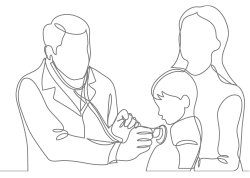Patient Advocates Have a Critical Role in Preventing Medication Errors
2023-07-11
-

A patient advocate is someone who, with the patient’s consent, supports that person in their interactions with health care providers. This support can be provided during visits to a doctor's office, on a trip to the pharmacy, during a hospital stay, or when a nurse comes to visit in the home. An advocate can be a family member or friend, or it might be someone outside the patient's circle who offers or agrees to take on this role. An advocate can help in a variety of ways, including sharing information as needed and helping the patient understand and remember details from the visit. Having an advocate present, especially for individuals who find it hard to speak for themselves, can help prevent medication errors.
SafeMedicationUse.ca received a report from a parent who advocated for their infant. The child needed daily medications for a medical condition. During a hospital stay, the doctor stopped one of the medications. When a nurse came to give the medication that had been stopped, the parent spoke up and asked for the medication not to be given. Despite some resistance, the parent insisted that the nurse check with the doctor, who confirmed that the medication was stopped. The parent's advocacy prevented an error from occurring.
SafeMedicationUse.ca has the following tips for patient advocates to help prevent medication errors:
-
If you see an error or recognize that one is about to occur, respectfully speak to the health care provider to raise your concern. Approach the situation from the perspective of seeking understanding, ask that an additional check take place, and be assertive if you believe there is a problem.
-
If you feel rushed in any way, let the health care provider know that you need more time or more information.
-
Help the patient keep an up-to-date medication list that includes not only prescribed tablets and capsules, but also medicated creams, vitamins, and natural health products. Ensure the list is brought to all of the patient's health care appointments.
-
Take notes when health care providers are sharing information with the patient. It can be hard to remember all the information provided during a health care visit.
-
Use the 5 Questions to Ask About Your Medications to help guide your conversations.
This newsletter was developed in collaboration with Best Medicines Coalition and Patients for Patient Safety Canada.
Recommendations are shared with healthcare providers, through the ISMP Canada Safety Bulletin, so that changes can be made together.
|

